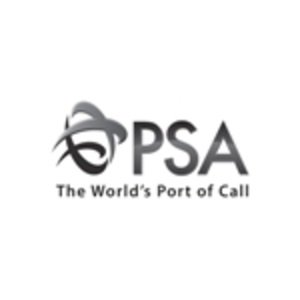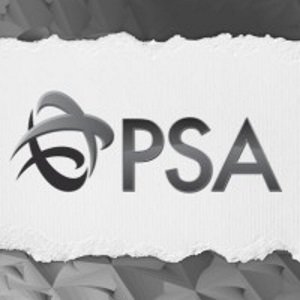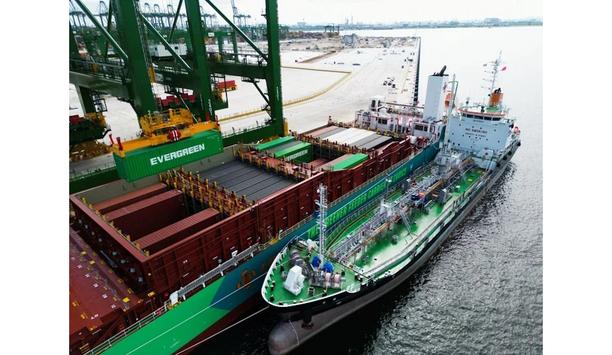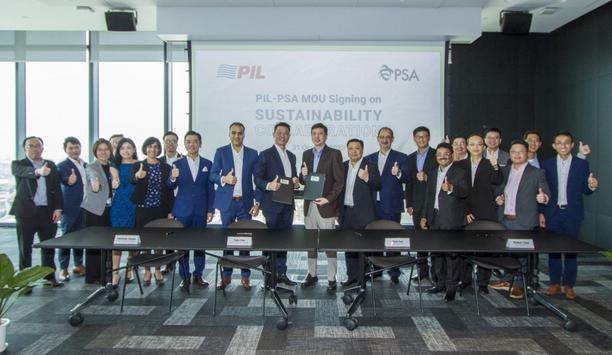PSA Singapore (PSA) - Experts & Thought Leaders
Latest PSA Singapore (PSA) news & announcements
X-Press Feeders, the world's largest independent common carrier, along with the Maritime and Port Authority of Singapore and PSA Singapore has achieved a historic milestone towards sustainable shipping with the arrival in Singapore and successful refuelling of X-Press Feeders’ first dual-fuel vessel. This vessel, the first to dock and refuel with green methanol in the Port of Singapore, underlines the nation's commitment to supporting the transition to renewable fuels in the global maritime industry. MAN 5S50ME dual-fuel engine X-Press Feeders and PSA worked jointly to refuel the vessel while the cargo was being loaded This technologically advanced vessel, the first of its kind to be built in China, is equipped with a German-designed MAN 5S50ME dual-fuel engine and offers the flexibility to operate on green methanol. It is on its maiden voyage from Shanghai to Rotterdam, with the crucial stop here in Singapore where X-Press Feeders and PSA worked together to refuel the vessel while cargo was being loaded and unloaded. New green feeder routes "This milestone represents a significant leap forward for X-Press Feeders and the global maritime industry," said Francis Goh, X-Press Feeders’ Chief Operating Officer. Francis Goh adds, "We are proud to lead the way in developing and implementing innovative solutions that will drastically reduce the maritime shipping industry’s environmental footprint. By pioneering the use of dual-fuel vessels, we are taking significant steps today to meet the targets for reductions in greenhouse gas (GHG) emissions." The vessel will play a pivotal role in establishing in Q3 2024 X-Press Feeders’ new green feeder routes - the Green Baltic X-PRESS (GBX) and Green Finland X-PRESS (GFX). This will be the first feeder network in Europe powered by green methanol. X-Press Feeders received The routes will be: Green Baltic X-PRESS (GBX): Rotterdam > Antwerp-Bruges > Klaipeda > Riga > Rotterdam Green Finland X-PRESS (GFX): Rotterdam > Antwerp-Bruges > Helsinki > Tallinn > HaminaKotka > Rotterdam X-Press Feeders received in mid-May the first of 14 dual-fuel ships on order. The first vessel was delivered from the New Yangzijiang Shipyard. OCI HyFuel's green methanol X-Press Feeders’ green methanol-powered feeder routes will be centred in the ports of Rotterdam and Antwerp-Bruges, where the shipping line has a firm contract with Dutch fuel supplier OCI Global to supply its dual-fuel vessels with green methanol. OCI Global is the world's pioneering green methanol producer. OCI HyFuel's green methanol is ISCC EU (International Sustainability and Carbon Certification) certified and reduces greenhouse gas emissions by 65%. Also known as bio-methanol, the fuel is a renewable energy source produced from the decomposition of organic matter, such as waste and residues.
In a collective journey towards achieving net zero greenhouse gases (GHG) emissions, PSA Singapore (PSA) and Pacific International Lines (PIL) have signed a Memorandum of Understanding (MoU) to jointly develop sustainable solutions to cut carbon emissions and optimise maritime efficiency. The collaboration between the two long-time partners includes the development of a set of low carbon emission routes for containers shipped by PIL via PSA. PSA Singapore and PIL sign MoU Beyond the MoU, both partners are also cooperating in GHG emissions reduction levers Beyond the MoU, both partners are also cooperating in GHG emissions reduction levers, such as the use of reclaimed refrigerant and the adoption of PSA’s OptEVoyage, a digital solution for vessels to arrive at the port just in time to achieve bunker savings and carbon emissions reduction. PSA has extensive know-how and experience in container port operations and managing cargo flows, and PIL is the largest home-grown carrier in Southeast Asia with strong networks in Asia, Africa, Middle East, Latin America and Oceania. Share common goal to achieve net zero emissions by 2050 The two majors in their respective fields, with a common goal to achieve net zero emissions by 2050, will leverage each other’s expertise, resources and innovation to work towards developing low carbon pathways. In April 2022, PIL successfully conducted a biofuel trial using a blend of fatty acid methyl esters (FAME) and very low sulfur fuel oil (VLSFO). Encouraged by the results, PIL intends to trial another blend of biofuel on its Singapore Qinzhou Shuttle (SQS) service as part of this MOU. This trial will involve a blend of 24% FAME with VLSFO. Steps to reduce carbon emissions in the shipping industry It is imperative that we take proactive steps to reduce carbon emissions throughout the shipping industry" Mr. Nelson Quek, Regional CEO Southeast Asia, PSA International, said, “Given the ever-increasing global challenges stemming from climate change, it is imperative that we take proactive steps to reduce carbon emissions throughout the shipping industry. This will require the collective efforts of all players in the maritime supply chain sector.” He adds, “PSA is pleased to partner PIL as we take the bold and essential step towards decarbonising the global supply chains that power our economy. We remain committed to working hand-in-hand with like-minded stakeholders, as we spur concerted action towards our transition to a cleaner and sustainable future beyond the areas served by our ports.” PIL and PSA to co-develop sustainable shipping solutions Mr. Abhishek Chawla, General Manager Operations & Procurement, Pacific International Lines (PIL), said, “PIL is delighted to partner PSA in co-developing sustainable shipping solutions for our common target of attaining net zero emissions.” He adds, “As PIL actively explores and invests in solutions to reduce emissions across our organisation, we believe in the importance of collaborating with like-minded partners like PSA. Together, we can deliver a greener future for the shipping industry!”
The Maritime and Port Authority of Singapore (MPA), the Port of Rotterdam Authority (PoR) and 20 partners in the Green & Digital Shipping Corridor are working to reduce 20% to 30% of emissions from international shipping by 2030. This was agreed at the third Green Corridor workshop, held this week in Rotterdam. Green & Digital Shipping Corridor The Green & Digital Shipping Corridor was established in August 2022 to bring together partners across the supply chain to realise zero and near-zero emissions shipping on the Rotterdam-Singapore route, with the ultimate aim to reach net-zero emissions in 2050. Over the past year, the corridor attracted strong support from global value-chain partners Over the past year, the corridor attracted strong support from global value-chain partners, including shipping lines, port authorities and operators, fuel suppliers, fuel coalitions and associations, banks, leading institutes of higher learning and knowledge partners. Reducing greenhouse gas emissions The project partners are working towards reducing greenhouse gas emissions from this international shipping corridor by 20%, striving for 30%, by 2030, compared to 2022. The corridor will continue to deepen efforts towards achieving the strengthened ambition of the International Maritime Organization (IMO) under the 2023 IMO Strategy on Reduction of GHG Emissions from Ships. This is to be achieved through the development and uptake of zero and near-zero emission fuels in large containers vessels (of at least 8,000 TEU) deployed on the 15,000 km route, supported by a combination of operational and digital efficiencies. Multiple alternative fuels explored A modelling study led by the Mærsk Mc-Kinney Møller Center for Zero-Carbon Shipping, one of the corridor partners for the project, and supported by the ports, explored multiple alternative fuels across a variety of zero and near-zero emission pathways, including synthetic and bio-variants of methanol, ammonia and LNG. Beyond the study, hydrogen is one other alternative fuel pathway to be looked at. Efforts are underway to aggregate demand and supply to reduce cost gap towards adoption of sustainable fuels. Identify action steps for the various fuel pathways Working groups have been established to look into the deployment of all of these fuels on the trade lane Working groups have been established to look into the deployment of all of these fuels on the trade lane, spanning across demand and supply of fuel, standards, safety procedures, financing and regulations. The corridor partners gathered in Rotterdam, Netherlands this week, in order to identify action steps for the various fuel pathways. Enabling the use of new fuels Low carbon fuels will likely be more expensive than existing fuels. Therefore, a separate working group has been formed with the support of the Global Maritime Forum, the Centre for Maritime Studies of the National University of Singapore, University of Oxford, and Citi, to address gaps in regulation and financing. The study includes modelling price-gap differences to incentivise the uptake of alternative fuels. In addition, Singapore and Rotterdam have jointly assessed the readiness of both ports and steps ahead, such as adopting similar bunkering standards and safety frameworks to accelerate the adoption of zero and near-zero emission fuels on this major trade route. This was put into action in Q3 2023 with the conduct of ship-to-ship green methanol bunkering on the world’s first methanol-fuelled container ship at both - the Port of Singapore and Rotterdam. The partners believe that the corridor’s approach, supported by the strong industry coalition will provide greater certainty in demand and help scale-up production of zero and near-zero emission fuels. This will help to close the cost gap and encourage even wider adoption of such fuels. Digital trade lanes Rotterdam and Singapore are the first ports adopting and sharing port and vessel information Rotterdam and Singapore are the first ports adopting and sharing port and vessel information, such as arrival and departure timings in accordance with global standards, namely the IMO & International Hydrographic Organization (IHO) standards to enable systems interoperability. Both ports are also promoting the use of electronic bills of lading and digital solutions such as just-in-time planning and coordination to enhance efficiencies and reduce GHG emissions. Partners in the Green & Digital Shipping Corridor The Maritime and Port Authority of Singapore, the Port of Rotterdam, A.P. Moller Maersk A/S, bp, the Centre for Maritime Studies of the National University of Singapore, Citi, Clifford Capital, CMA CGM, Digital Container Shipping Association, the Global Centre for Maritime Decarbonisation, the Global Maritime Forum, the Mærsk Mc-Kinney Møller Center for Zero-Carbon Shipping, Methanol Institute, MSC, Nanyang Technological University Maritime Energy and Sustainable Development Centre of Excellence, Ocean Network Express, PSA International, RMI, SEA-LNG, Shell, University of Oxford, Yara Clean Ammonia.





